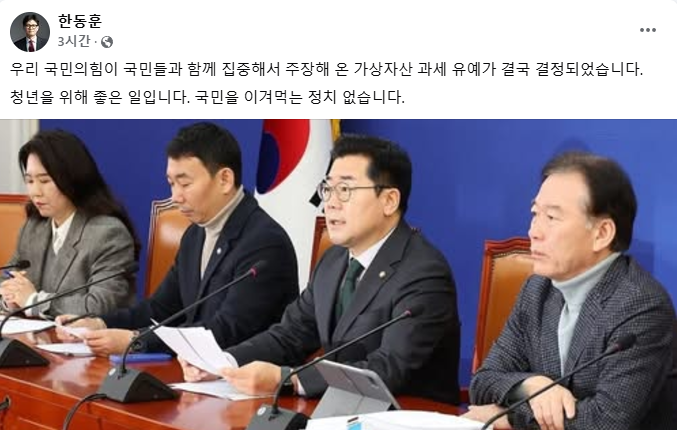
The ruling and opposition parties in South Korea have agreed to postpone the taxation on virtual asset income by two years. With the Democratic Party of Korea (DPK) accepting the proposal long advocated by the People Power Party (PPP), the implementation of the tax is now set for 2027. The decision reflects political efforts to address the concerns of youth investors and the virtual asset industry.
On December 1, Democratic Party Floor Leader Park Chan-dae announced in a press conference at the National Assembly, “After extensive deliberation, we concluded that additional institutional reforms are needed before taxation on virtual assets can proceed. We have therefore agreed to a two-year delay.” Following the announcement, PPP leader Han Dong-hoon responded on social media, stating, “The decision to delay virtual asset taxation is a victory for the people. It is a good move for young people.”
Agreement Reached After Prolonged Standoff
The PPP had previously framed the virtual asset tax as a “youth tax,” emphasizing the need to support young people’s wealth-building efforts by deferring the tax. Conversely, the DPK, adhering to the principle of “taxation where there is income,” proposed increasing the tax exemption threshold while proceeding with the taxation as scheduled. However, during budget-related negotiations, the two parties ultimately reached an agreement to adopt the delay.
Democratic Party leadership noted that the decision resulted from extensive internal debates and political considerations. “This was not a unanimous decision within the party, but it reflects a careful judgment of the current market conditions and the right path forward,” said a party insider.
Mixed Reactions from Industry and Investors
The virtual asset industry welcomed the tax delay, but concerns remain about whether institutional reforms will proceed swiftly and effectively. Industry stakeholders pointed out unresolved issues such as disparities in taxation between domestic and international exchanges and ambiguities in existing regulations like the Specific Financial Information Act (Special Act) and the Virtual Asset Act.
An industry representative noted, “If taxation begins without addressing the significant gaps between the legal framework and market realities, there will likely be blind spots in investor protection and tax equity. It is critical to utilize this delay period to implement institutional reforms.”
Challenges in tracking transactions on international exchanges were also highlighted. In response, financial authorities are exploring measures to restrict unauthorized foreign exchanges from operating domestically and considering aligning domestic regulations with global standards.

Key Tasks Ahead: Institutional Reforms and Global Competitiveness
Both the political sphere and the virtual asset industry agree that the delay provides an opportunity to address market uncertainties through robust institutional reforms. However, there is skepticism about whether these reforms can keep pace with the rapidly evolving virtual asset market.
A government official noted, “Strengthening Korea’s global competitiveness in the virtual asset sector requires urgent internal institutional alignment. This delay is a strategic decision balancing market growth and regulatory stability.”
The two-year postponement will test how effectively policymakers can adapt to market dynamics while establishing a fair and transparent framework for virtual asset taxation.




![[November]Uptober No More](https://coinhubkorea.com/wp-content/uploads/2025/10/Whisk_d78880efb01a730907f4be201effefe1dr-1-100x70.jpeg)

